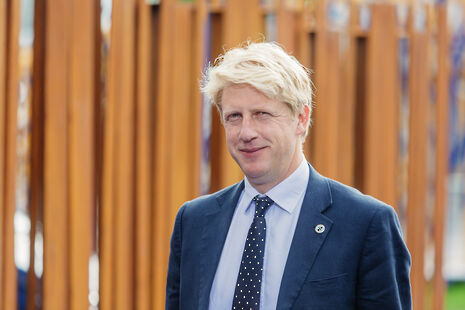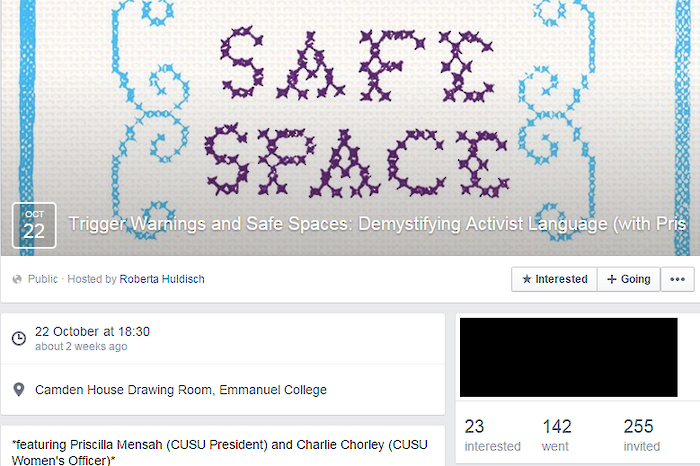Removing Jo Johnson puts free speech in universities at risk
Michael Reiners explains why Jo Johnson’s plan to tackle the ‘no-platforming’ phenomenon could have been what was needed for the future of freedom of speech in British universities

In its invitation to potential contributors, Varsity describes itself as the home of “proudly independent” quality student journalism in Cambridge. Another tenet of this paper is that Opinion should “be open to everyone” and while I am glad that these luxuries are afforded to students, I am perplexed when they are denied to those that come to speak to them. It is for this reason that Jo Johnson planned to fine universities who fail to “uphold free speech”, in what would have been a welcome move from the recently removed Universities and Science minister.
Universities have struggled in recent years to balance students’ concerns with protecting freedom of thought, and by extension, speech. A few notable examples have hit the national press. Germaine Greer’s talk at Cardiff University was boycotted due to what a petition deemed, her “problematic views” on trans people. In October 2016, Peter Hitchens gave a talk in the street, having refused to sign an ironically named free-speech contract with Liverpool University, which required him to provide a transcript of his speech. Closer to home, Peterhouse’s Beard Society revoked radical feminist Linda Bellos’ invitation to speak because she wanted to offer some fairly benign intersectional insights on transgenderism’s place within feminism. This was considered too risqué by the choir who invited her to speak.
Freedom of speech discourse has a history so lengthy that the very phrase itself conjures up images of the ongoing right-wing plot to leave Europe swaddled in a St. George’s flag, hurling racially-charged abuse at non-white Labour politicians. This should not be the case. Freedom of speech ought to be a given for those in higher education. However, universities are businesses, thus their reaction to a handful of dissatisfied customers is hardly surprising. It is only natural that a business would not want to sacrifice the free, prestigious advertisement that a high league table position affords. With student satisfaction contributing significantly to the yearly ranking, many universities are eager to succumb to the demands of a vocal minority at the expense of allowing Mr Hitchens say something a bit ‘edgy’.
“Thanks to modern technology, it is easier to stand on one’s soapbox nowadays, it requires much less effort”
A point of criticism for this social hysteria is that when we acquiesce to students’ demands, this comes at the cost of an education which deviates from their worldview; the student becomes the master. To my mind, it would be far more damning for a speaker to arrive at a university and to be met with a deserted venue, than being denied the right to speak in the first place. But is this a new phenomenon? Definitely not. And most certainly not in Cambridge, where even the Soviet Union enjoyed a certain vogue in the 1930s. More broadly, there were fears of the student body becoming what both Kenneth Clarke and Slavoj Zizek called the “new revolutionary subject” in the 1960s and 2010s respectively, even modernist accommodation was a concern. What is new, is that students have the ability to organise themselves in opposition to speakers and newspapers by means of online petitions and demonstrations. Thanks to modern technology, it is easier to stand on one’s soapbox nowadays, it requires much less effort. Imagine coordinating a rally to denounce Katie Hopkins’s use of cockroach imagery to describe migrants without a Facebook event – I daresay hardly anyone would show up!
The most revolutionary thing to come out of universities in the UK is an apathetic dislike of the media publications which express sympathy for the right. Students at City University London voted to ban the Mail, Sun and Express from campus because “freedom of speech should not be used as an excuse to attack the weakest and poorest members of society”. These traditionally working-class papers evidently do not sit right with a readership almost entirely made up of middle-class university students.
Jo Johnson’s plan to fine universities for such actions appeared to be a pro-active response to the greater hysteria in the United States. Middle of the road conservative pundit Ben Shapiro forked out as much as 500,000 dollars in security alone to speak at Berkley University. On the other hand, Bret Weinstein was offered the same sum in severance pay after retaliating against a group of students at Evergreen State College Washington, who demanded “Day of Absence”, expelling all white people from campus to provide a non-white safe space.
To anyone of sound mind, this all seems like an expensive exercise in lunacy, for both institutions and speakers. It was once in the realm of the so-called left to defend freedom of speech and the press, now, we face a total inversion of this. Let us hope Johnson’s successor, Sam Gyimah, feels the same way
 Interviews / ‘People just walk away’: the sense of exclusion felt by foundation year students19 April 2024
Interviews / ‘People just walk away’: the sense of exclusion felt by foundation year students19 April 2024 News / Controversy on the Cam: John’s spend almost 90 times more on rowing than other colleges19 April 2024
News / Controversy on the Cam: John’s spend almost 90 times more on rowing than other colleges19 April 2024 Theatre / The closest Cambridge comes to a Drama degree 19 April 2024
Theatre / The closest Cambridge comes to a Drama degree 19 April 2024 News / Emmanuel College cuts ties with ‘race-realist’ fellow19 April 2024
News / Emmanuel College cuts ties with ‘race-realist’ fellow19 April 2024 News / Corpus student left with dirty water for over six months21 April 2024
News / Corpus student left with dirty water for over six months21 April 2024






